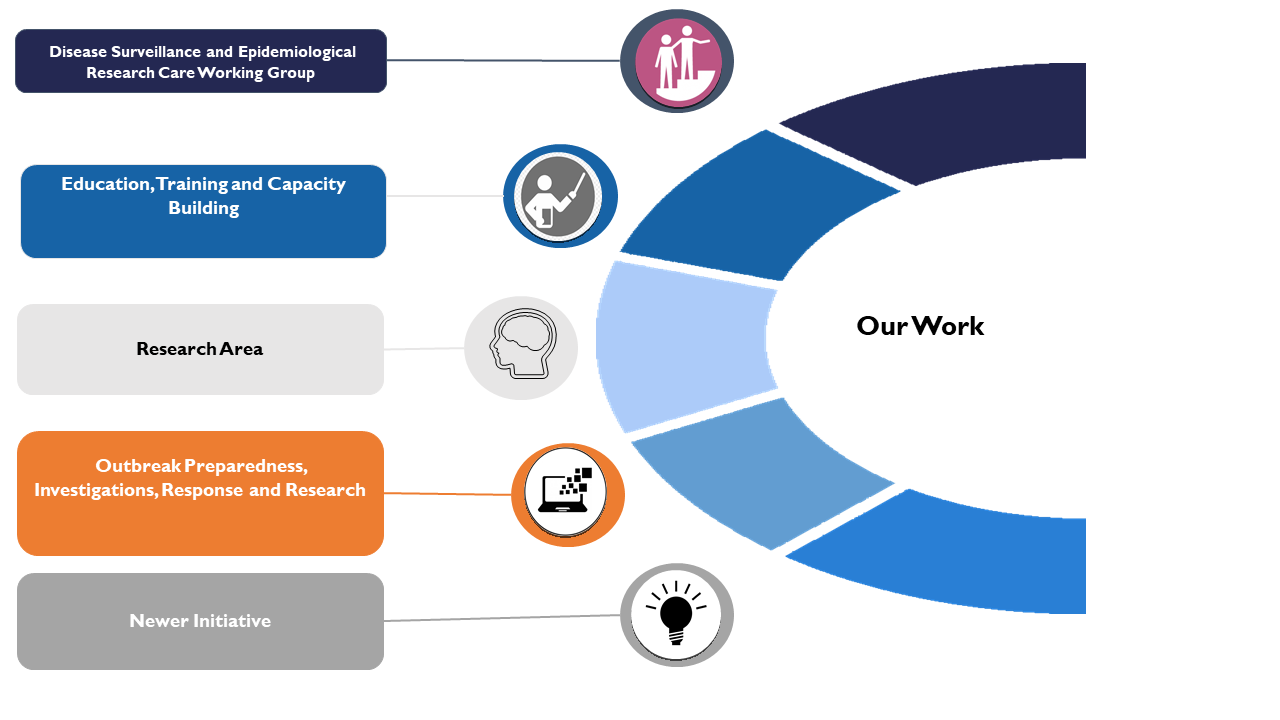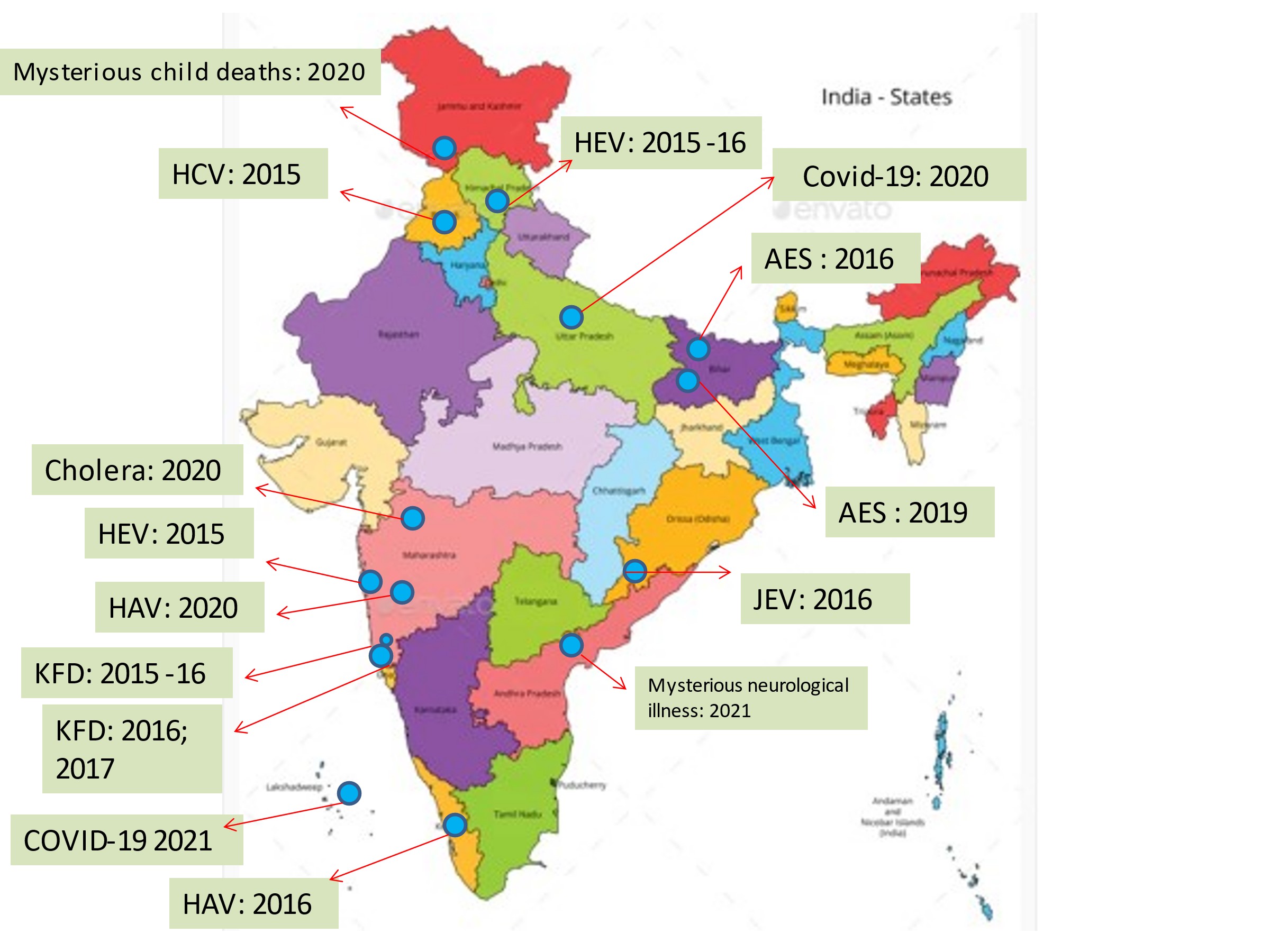| Sr. No. | Name of the staff | Designation |
|---|---|---|
| 1 | Dr. Babasaheb V. Tandale | Scientist G and Group Leader |
| 2 | Dr. Avinash R. Deoshatwar | Scientist E |
| 3 | Dr. Kunal H. Pise | Scientist E |
| 4 | Dr. Abhijeet V Jadhav | Scientist E |
| 5 | Dr. Shrinivasa | Scientist B |
The Mobile and Emergency Investigation (MEI) section was established as the field epidemiology unit in Virus Research Centre (VRC). The MEI section was renamed the Epidemiology and Biostatistics division in 1972, and later as Epidemiology Division in 1976. Further, in 2004, the Epidemiology Division was renamed as Outbreak Response Group (ORG) with a major focus on outbreak investigations. In 2010, the Outbreak Response Group was renamed the Epidemiology Group. The group has five scientists and five technical staff. During the large-scale outbreaks, the scientific and technical staff from other groups provides help for the field investigations.

The Group mainly focuses on preparedness and response to emerging and re-emerging viral infections. Investigations of outbreaks are undertaken for-
• identifying viral etiologies
• characterizing outbreaks in time, place and person
• identifying the source of infection and mode of transmission; and
• suggesting prevention and control measures.
Outbreak investigations are undertaken in response to the requests from central, state and district/municipal public health authorities. Proactive ad-hoc outbreak investigations are also launched based on laboratory data review and screening of media reports. Outbreak response activities are also provided during public health emergencies and disasters. The group investigated outbreaks of –
• Pandemic and Avian influenza
• Hepatitis
• Japanese encephalitis
• Dengue
• Chikungunya
• Chandipura
• Buffalopox
• Crimean Congo haemorrhagic fever (CCHF)
• Acute Encephalitis Syndrome (AES)
• Kyasanur Forest Disease (KFD)
• Dengue-like illness and
• Several unidentified or mysterious outbreaks.
Serosurveys for virus infections were undertaken in Andhra Pradesh, Maharashtra, Gujarat, Kerala, Bihar, Goa, Madhya Pradesh and Uttar Pradesh. We conduct disease surveillance and research studies in community, hospital and institutional settings for understanding the epidemiology of viral diseases of public health importance in India. Community-based surveillance of viral diseases and syndromes and hospital-based surveillance of acute encephalitis syndromes are undertaken in the recent past. Also, field effectiveness studies on JE vaccines were undertaken in endemic states. The Group also extends support to various other research groups within the Institute and also undertakes collaborative research with research groups and other institutions.
As part of its training and human resource development initiatives, the group offers training in ‘Outbreak Investigations’ to the scientific and technical staff of ICMR-NIV as well as other government agencies. Outbreak investigation modules are administered to the participating virus research and diagnostic laboratories (VRDL) network laboratory and clinical faculties. A DHR-funded month-long training course was offered earlier. The group also coordinates the Epidemiology course for MSc Virology students at ICMR-NIV Pune. Students are taught the principles of basic and advanced epidemiology. In addition, orientation visits are allowed for interaction of medical postgraduate students, including internships for MPH students. The scientists extend support and mentor the medical residents for research skills, along with guiding the MSc Virology students in their research projects for dissertation work.
Outbreak investigations of viral diseases: The primary mandate of the group is to respond to outbreaks of various known or suspected viral etiologies across the country. The group responds to calls from national or state health agencies/ministries in health emergencies. Ad-hoc outbreak investigations are also undertaken as and when required.
Seroepidemiology of viral infections: Seroepidemiology studies, in many situations, are the studies that guide future analytical studies in respective areas. The group has conducted seroepidemiology studies in dengue, CCHF, influenza, hepatitis viruses, etc. which have generated significant information or paved the way for further studies.
Population-based cohort studies: The group had the ‘Janata Vasahat slum, Pune’ population under surveillance for viral and bacterial syndromes for over five years. Multi-centric population-based cohort studies will be planned in future.
Additional areas of research work
o Clinical studies including disease spectrum, outcomes and sequelae
o Epidemiological studies for the extent of infection, immunity, risk and spread
o Vaccine studies for extended field safety, immunogenicity and efficacy
o Infection transmission dynamics and modelling studies for estimations
o Immunization and surveillance-related implementation research studies
o Systematic reviews and Metanalyses on epidemiological and clinical aspects
o Social epidemiology of epidemic viral diseases of public health importance
o Community engagement for virus diseases surveillance/prevention research
o Operational and implementation research on health programme interventions
o Environmental studies including climate change impact on human health
| Sr. No. | Name of the staff | Designation |
|---|---|---|
| 1 | Dr. Babasaheb V. Tandale | Scientist G and Group Leader |
| 2 | Dr. Avinash R. Deoshatwar | Scientist E |
| 3 | Dr. Kunal H. Pise | Scientist E |
| 4 | Dr. Abhijeet V Jadhav | Scientist E |
| 5 | Dr. Shrinivasa | Scientist B |
| Sr. No. | Name of the staff | Designation |
|---|---|---|
| 1 | Mr. Kailash B. Gadekar | Technical Assistant |
| 2 | Mr. Machhindra Karanjawane | Technician-C |
| 3 | Mr. Rahul H. Jagtap | Technician-B |
| 4 | Mr. Avanish Pande | Technician-A |
| 5 | Mr. Vishal Khond | Multi Tasking Staff |
| Sr. No. | Name of the staff | Designation |
|---|---|---|
| 1 | Ms. Suman M Mhatre | Technical Support III |
1. Proportion of infection of SARS-CoV-2 among non-healthcare essential service providers in Pune city
PI: Dr. Avinash R. Deoshatwar
Funding: Intramural
Duration:6 months
2. Explorations into causes of high seropositivity for SARS-CoV-2 in lower socio-economic status populations in Pune district: A qualitative and quantitative mixed methods study
PI: Dr. Avinash R. Deoshatwar
Funding:Intramural
Duration:4 months
Present status: Project review committee approved
3. Virological and molecular characterization of SARS-CoV-2 variants in Maharashtra
PI: Dr Babasaheb V. Tandale
Funding: Intramural
Duration: 3 months
4. Mobile application for immunization data in India [MAIDI]
PI: Dr. Babasaheb V. Tandale
Funding: ICMR-Extramural funds
Duration: 18 months
5. Estimation of population immunity against hepatitis A virus [HAV] and associated risk factors in different epidemiological transition level [ETL] states of India
PI: Dr. Avinash R. Deoshatwar
Funding: ICMR-Extramural funding approved
Duration: 2 years
6. Development of Automated chlorination monitoring system
PI: Dr. Avinash R. Deoshatwar
Funding: Intramural funding approved
Duration: 2 years
7. Critical appraisal of surveillance, management and vaccination of Japanese encephalitis and acute encephalitis syndrome in India: programme implementation research in selected endemic states.
PI: Dr. Babasaheb V. Tandale
Funding: Intramural funds
Duration: 36 months (2017-2021)
8. Japanese encephalitis epidemiology in central part of India: Enhanced sentinel surveillance for etiological contribution and burden following vaccination in Maharashtra and Telangana
PI: Dr. Babasaheb V. Tandale
Funding: ICMR-Extramural funds
Duration: 36 months (2018-2021)
9. Clinical and immunological profiling of post-COVID syndrome among patients attending a tertiary care centre in Pune, Maharashtra
PI: Dr. Sreelakshmi PR
Funding: Intramural funds
Duration: 06 months
10. Surveillance of febrile episodes for virus etiologies research in clinics from urban areas of Pune
PI: Dr. Babasaheb V. Tandale
Funding: Intramural funds (1st year), Extramural (2 years)
Duration: 36 months (2022-2024)
11. Hepatitis E virus circulation in different states of India: An add-on study
PI: Dr. Avinash R. Deoshatwar
Funding: Intramural funding approved
Duration: 2 years (2021-2023)

Satara – Karad Field tour Hepatitis A outbreak 18-Aug-2021
| |
|
|
|
|
| |
COVID-19 outbreak at Pune 2020 | |
|
|
|
|
|
|
|
|
COVID-19 Outbreak 2020 | |
(MAIDI ) Project Meeting with Medical officer of Khadakwasla PHC in Pune 2019 | |
|
|
|
|
Warangal Field Tour JE Project |
|